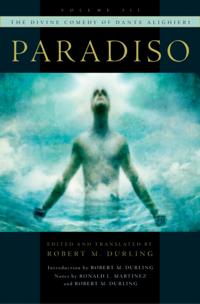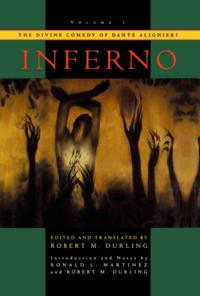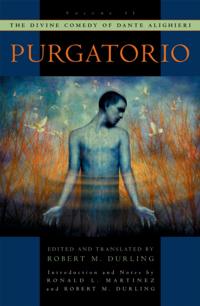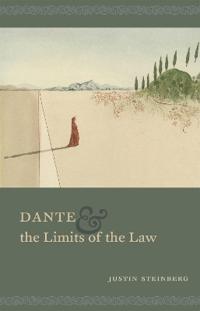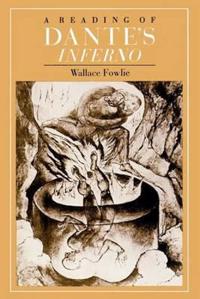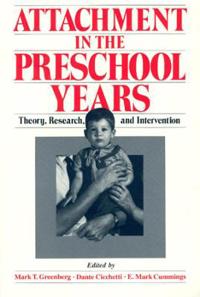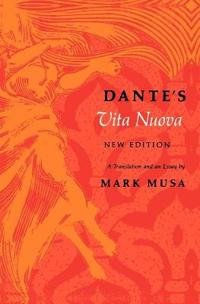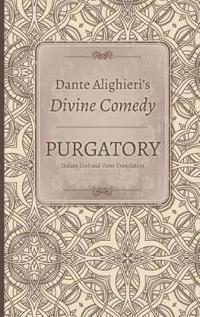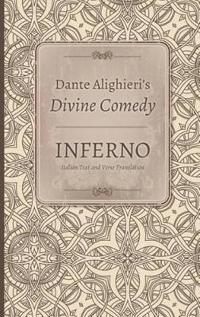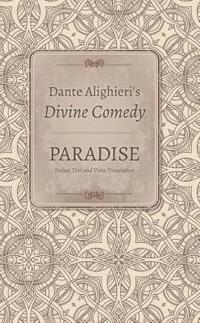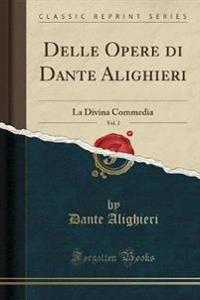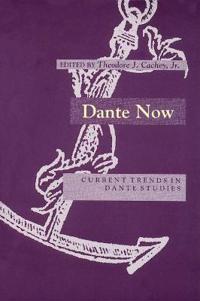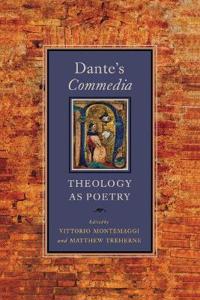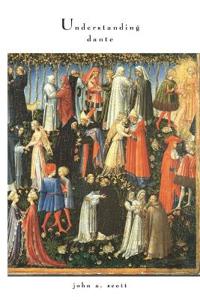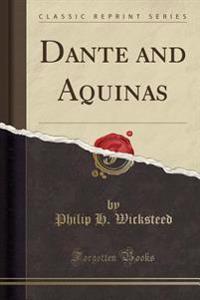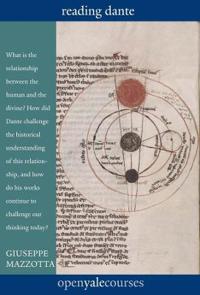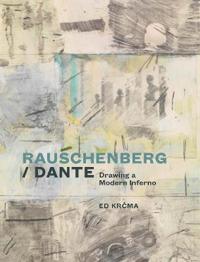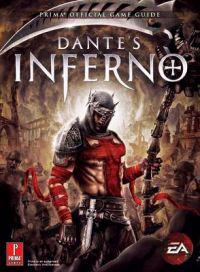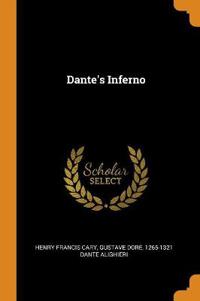Divine Comedy of Dante Alighieri: Volume 3: Paradiso
ISBN: 9780199752690 - UTGIVEN: 2015-07Robert Durling's spirited new prose translation of the Paradiso completes his masterful rendering of the Divine Comedy. Durling's earlier translations of the Inferno and the Purgatorio garnered high praise, and with this superb version of the Paradiso readers can now traverse the entirety of Dante's[...]
Divine Comedy of Dante Alighieri: Volume 1: Inferno
ISBN: 9780199770335 - UTGIVEN: 2015-06This is the first volume of a new prose translation of Dante's epic - the first in twenty-five years. Robert Durling's translation brings a new power and accuracy to the rendering of Dante's extraordinary vision of Hell, with its terror, pathos, and sardonic humour, and its penetrating analyses of t[...]
Divine Comedy of Dante Alighieri: Volume 2: Purgatorio
ISBN: 9780199879830 - UTGIVEN: 2015-08In the early 1300s, Dante Alighieri set out to write the three volumes which make the up The Divine Comedy. Purgatorio is the second volume in this set and opens with Dante the poet picturing Dante the pilgrim coming out of the pit of hell. Similar to the Inferno (34 cantos), this volume is divided [...]
Dante and the Limits of the Law (Inbunden)
avJustin Steinberg
ISBN: 9780226071091 - UTGIVEN: 2013-12In Dante and the Limits of the Law, Justin Steinberg offers the first comprehensive study of the legal structure crucial to Dante's Divine Comedy. Steinberg reveals how Dante imagines an afterlife dominated by elaborate laws, hierarchical jurisdictions, and rationalized punishments and rewards. Stei[...]
A Reading of Dante's "Inferno" (Häftad)
avWallace Fowlie
ISBN: 9780226258881 - UTGIVEN: 198105This work is a guide to the reading of Dante's great poem, intended for the use of students and laymen, particularly those who are approaching the "Inferno "for the first time. While carefully pointing out the uniqueness, tone, and color of each of Dante's thirty-four cantos, Fowlie never loses sigh[...]
Attachment in the Preschool Years (Pocket)
avMark T. Greenberg, Dante Cicchetti, E. Mark (EDT) Cummings
ISBN: 9780226306308 - UTGIVEN: 1993-05This collection of original articles by leading specialists in child development brings together work from diverse backgrounds and disciplines to establish, for the first time, the importance of the preschool period (eighteen months to four years)for parent-child attachment relationships. Balancing [...]
Dante and the Limits of the Law (häftad)
ISBN: 9780226362069 - UTGIVEN: 2016-06In Dante and the Limits of the Law, Justin Steinberg offers the first comprehensive study of the legal structure essential to Dante s Divine Comedy. Steinberg reveals how Dante imagines an afterlife dominated by sophisticated laws, hierarchical jurisdictions, and rationalized punishments and rewards[...]
Dante's Vita Nuova
ISBN: 9780253201621 - UTGIVEN: 1973-06In this new edition Musa views Dante's intention as one of cruel and comic commentary on the shallowness and self-pity of his protagonist, who only occasionally glimpses the true nature of love. "... the explication de texte which accompanies [Musa's] translation is instructively novel, always admir[...]
Delle Opere Di Dante Alighieri, Vol. 2: La Divina Commedia (Classic Reprint)
ISBN: 9780259828617 - UTGIVEN: 2018-11Challenging Dante (Häftad)
avLynne Graham
ISBN: 9780263900392 - UTGIVEN: 201308When trouble comes to stay...Unimpressed by his mother's new companion, shrewd Italian billionaire Dante Leonetti is determined to oust the cuckoo from his castle.i??After all, what could this beautiful, intelligent young woman want with his family other than a slice of their fortune? Topaz Marshall[...]
Dante Now
ISBN: 9780268008758 - UTGIVEN: 1995-04These essays arise from a conference on Dante held at the University of Notre Dame in 1993. They focus in particular on three areas: poetics (style, ideology, hermeneutics, epistemology); minor works (textual problems); and reception (in medieval England, in France and in film and video).[...]
Dante's Commedia (Häftad)
ISBN: 9780268035198 - UTGIVEN: 2010-03In "Dante's Commedia: Theology as Poetry," an international group of theologians and Dante scholars provide a uniquely rich set of perspectives focused on the relationship between theology and poetry in the "Commedia." Examining Dante's treatment of questions of language, personhood, and the body; h[...]
Understanding Dante (Häftad)
avJohn A. Scott
ISBN: 9780268044510 - UTGIVEN: 2005-01"Dante and Shakespeare divide the modern world between them; there is no third". "Understanding Dante" attempts to explain and justify T.S. Eliot's bold claim. John Scott offers readers at all levels a critical overview of Dante's writings: five chapters deal with his "New Life" of love and poetry ([...]
Reading Dante (Pocket)
avGiuseppe Mazzotta
ISBN: 9780300191356 - UTGIVEN: 2014-01A towering figure in world literature, Dante wrote his great epic poem the Commedia in the early fourteenth century. The work gained universal acclaim and came to be known as La Divina Commedia, or The Divine Comedy. Guiseppe Mazzotta brings Dante and his masterpiece to life in this exploration of t[...]
Reading Dante
ISBN: 9780300199215 - UTGIVEN: 2013-11A towering figure in world literature, Dante wrote his great epic poem Commedia in the early fourteenth century. The work gained universal acclaim and came to be known as La Divina Commedia, or The Divine Comedy. Giuseppe Mazzotta brings Dante and his masterpiece to life in this exploration of the m[...]
Dante
ISBN: 9780300212594 - UTGIVEN: 2015-03The Divine Comedy, completed around 1320, is a supreme work of the imagination None of Dante's other works, nor even all of his other works taken together, can rival the Comedy. How did the Florentine exile come to create this masterpiece? What steps in his development can explain the making of this[...]
Rauschenberg / Dante
ISBN: 9780300221565 - UTGIVEN: 2017-05Dante's Inferno inspired Robert Rauschenberg (1925-2008) to create a series of 34 drawings that comprise one of the most remarkable creative enterprises of 20th-century American art. Completed between 1958 and 1960, XXXIV Drawings for Dante's Inferno introduced an innovative transfer process to the [...]
Dante Valentine: The Complete Series (Häftad)
avLilith Saintcrow
ISBN: 9780316101967 - UTGIVEN: 201103Necromancer. Bounty hunter. Killer.
Dante Valentine has been all three in her life. But in the beginning, she was a Necromancer for hire. And while she was choosy about her jobs, there were just some she couldn't turn down. Like when the Devil showed up at the door and offered her a deal. Her li[...]In the Hand of Dante (Häftad)
ISBN: 9780316735643 - UTGIVEN: 2003-09The discovery of an original manuscript of Dante's Inferno in the Vatican archives finds writer Nick Tosches heading for Rome to authenticate the find. Reprint.[...]
Dante's Inferno (häftad)
ISBN: 9780343044923 - UTGIVEN: 2018-10This work has been selected by scholars as being culturally important and is part of the knowledge base of civilization as we know it.This work is in the public domain in the United States of America, and possibly other nations. Within the United States, you may freely copy and distribute this work,[...]

